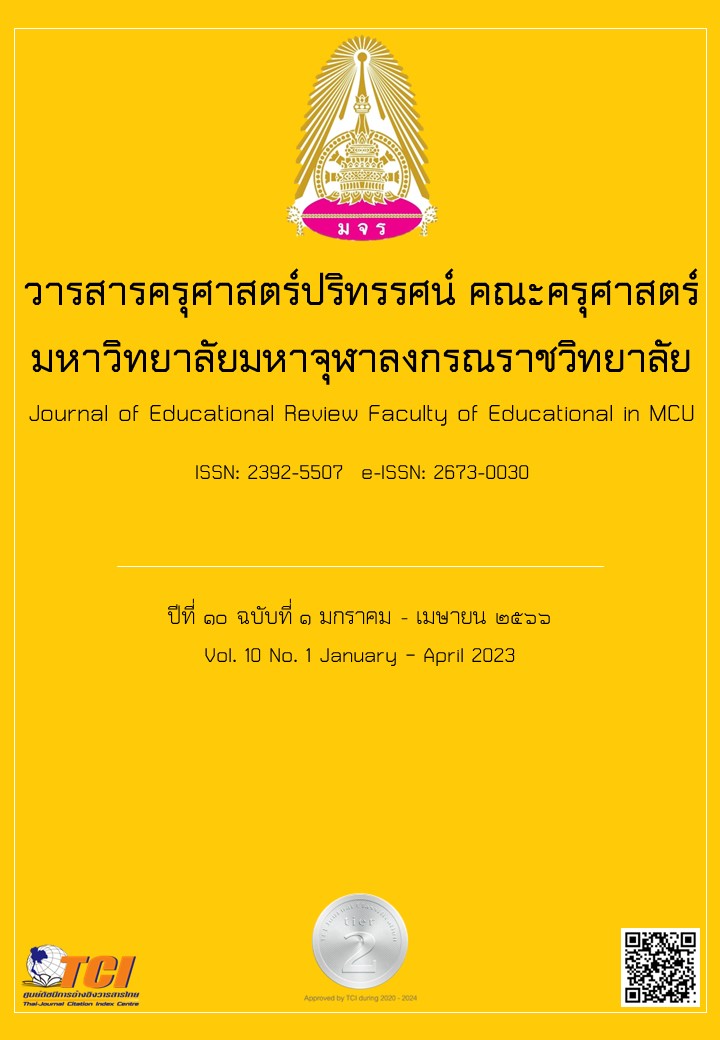A STUDY OF NEEDS FOR DEVELOPING COLLECTIVE RESPONSIBILITY OF TEACHERS IN SCHOOLS UNDER PUNJAPAKI CONSORTIUM, SECONDARY EDUCATIONAL SERVICE AREA SARABURI
Main Article Content
Abstract
The purpose of this descriptive research aims to study the needs of developing collective responsibility of teachers in schools under Punjapaki consortium, secondary educational service area Saraburi. The sample group consisted of 191 school administrators and teachers. The research instrument was a questionnaire. The data were analyzed by descriptive statistics which are frequency, percentage, mean, standard deviation, the need index value by PNImodified method and priority order. The results of the research found that the current state of overall collective responsibility was at a high level. In this state, the Teacher-Student interaction was the highest mean and the Student Motivation had the lowest mean. The desirable state of overall collective responsibility was at the highest level. In this state, the Teacher-Student interaction was the highest mean, and the Student Motivation had the lowest mean. The highest need was Student Achievement followed by Learning activities, Student Motivation respectively. The results of this research can be used for developing collective responsibility of teachers in schools under Punjapaki consortium, secondary educational service area Saraburi.
Article Details

This work is licensed under a Creative Commons Attribution-NonCommercial-NoDerivatives 4.0 International License.
ทัศนะและความคิดเห็นที่ปรากฏในบทความในวารสารฉบับนี้ถือเป็นความรับผิดชอบของผู้เขียนบทความนั้นเพียงผู้เดียว และไม่ถือเป็นทัศนะและความรับผิดชอบของกองบรรณาธิการ
กองบรรณาธิการขอสงวนสิทธิ์ในการคัดเลือกบทความลงตีพิมพ์และจะแจ้งให้เจ้าของบทความทราบหลังจากผู้ประเมินบทความตรวจอ่านบทความแล้ว
ต้นฉบับที่ได้รับการตีพิมพ์ในวารสารครุศาสตร์ปริทรรศน์ คณะครุศาสตร์ มหาวิทยาลัยมหาจุฬาลงกรณราชวิทยาลัย ถือเป็นกรรมสิทธิ์ของคณะครุศาสตร์ มหาวิทยาลัยมหาจุฬาลงกรณราชวิทยาลัย ห้ามนำข้อความทั้งหมดหรือบางส่วนไปพิมพ์ซ้ำ เว้นเสียแต่ว่าจะได้รับอนุญาตจากมหาวิทยาลัยฯ เป็นลายลักษณ์อักษร
References
ข้อบังคับคุรุสภาว่าด้วยจรรยาบรรณของวิชาชีพ พ.ศ. 2556. (2556). ราชกิจจานุเบกษา. เล่ม 130 ตอนพิเศษ 130 ง. หน้า 72-74. (4 ต.ค. 2556).
ข้อบังคับคุรุสภาว่าด้วยมาตรฐานวิชาชีพ ฉบับที่ 4 พ.ศ. 2562. (2562). ราชกิจจานุเบกษา. เล่ม 136 ตอนพิเศษ 68 ง. หน้า 18-20. (10 มี.ค. 2562).
แจ้ง บุตรโสภา. (2556). สภาพบรรยากาศการเรียนการสอนของศูนย์พัฒนาเด็กเล็ก สังกัดองค์กรปกครองส่วนท้องถิ่น อำเภอกระสัง จังหวัดบุรีรัมย์. วารสารวิชาการ มหาวิทยาลัยราชภัฏบุรีรัมย์. 5(1). 35-61.
ธัญญาภรณ์ คำแก้ว. (2562). ผลของการให้การปรึกษาแบบกลุ่มด้วยการสัมภาษณ์เพื่อเสริมสร้างแรงจูงใจต่อความรับผิดชอบในการเรียน ของนักเรียนชั้นมัธยมศึกษาปี ที่ 1. วารสารวิชาการและวิจัยสังคมศาสตร์. 14(3). 121-134.
พูนสุข อุดม. (2548). การจัดการเรียนการสอนแบบบูรณาการ. วารสารมหาวิทยาลัยทักษิณ. 8(2). 66-75
มโนธรรม ทองมหา. (2556). การวิเคราะห์ปัจจัยที่ส่งผลต่อความสำนึกรับผิดชอบของครูในผลการเรียนรู้ของนักเรียน: การวิจัยแบบผสมวิธี. วิทยานิพนธ์ครุศาสตรมหาบัณฑิต. จุฬาลงกรณ์มหาวิทยาลัย.
สถาบันส่งเสริมการสอนวิทยาศาสตร์และเทคโนโลยี. (2562). ผลการประเมิน PISA 2018 : บทสรุปสำหรับผู้บริหาร. แหล่งที่มา www.pisathailand.ipst.ac.th สืบค้นเมื่อ 4 มิ.ย. 2564.
สภานโยบายวิจัยและนวัตกรรมแห่งชาติ. (2560). (ร่าง) ยุทธศาสตร์การวิจัยและนวัตกรรม 20 ปี (พ.ศ. 2562 - 2579). กรุงเทพมหานคร: โคคูนแอนด์โค.
สำนักงานคณะกรรมการข้าราชการครูและบุคลากรทางการศึกษา. (2564). คู่มือการดำเนินการตามหลักเกณฑ์และวิธีการประเมินตำแหน่ง และวิทยฐานะข้าราชการครูและบุคลากรทางการศึกษา ตำแหน่งครู. แหล่งที่มา www.otepc.go.th สืบค้นเมื่อ 8 มิ.ย. 2564.
สำนักงานราชบัณฑิตยสภา. (2554). พจนานุกรม ฉบับราชบัณฑิตยสถาน 2554. แหล่งที่มา www.dictionary.orst.go.th สืบค้นเมื่อ 4 มิ.ย. 2564.
สำนักงานเลขาธิการคุรุสภา. (2560). ประกาศสำนักงานเลขาธิการคุรุสภา เรื่อง แนวทางการส่งเสริมสนับสนุนเครือข่ายพัฒนาวิชาชีพครูและบุคลากรทางการศึกษา แบบชุมชนแห่งการเรียนรู้ทางวิชาชีพ (Professional Learning Community : PLC) ประจำปี 2560. แหล่งที่มา www.spe.go.th สืบค้นเมื่อ 4 มิ.ย. 2564.
สำนักงานเลขาธิการสภาการศึกษา. (2560). แผนการศึกษาแห่งชาติ พ.ศ. 2560 – 2579. กรุงเทพมหานคร: พริกหวานกราฟฟิค.
สำนักงานศึกษาธิการจังหวัดสระบุรี. (2563). ข้อมูลสารสนเทศและดัชนีทางการศึกษาจังหวัดสระบุรี ปีการศึกษา 2563. แหล่งที่มา www.saraburipeo.go.th สืบค้นเมื่อ 15 มิ.ย. 2564.
สุกิจ ทวีศักดิ์. (2555). การพัฒนาคู่มือเสริมสร้างแรงจูงใจสำหรับนักเรียนมัธยมศึกษาที่ขาดแรงจูงใจ: การวิจัยแบบผสมวิธี. วิทยานิพนธ์ครุศาสตรมหาบัณฑิต. จุฬาลงกรณ์มหาวิทยาลัย.
สุมิตรา คุณวัฒน์บัณฑิต. (2557). ปัจจัยที่ส่งผลต่อความสำนึกรับผิดชอบร่วมกันของครูในผลการเรียนรู้ของนักเรียน. วิทยานิพนธ์ครุศาสตรมหาบัณฑิต. จุฬาลงกรณ์มหาวิทยาลัย.
สุวิมล ว่องวาณิช. (2558). การวิจัยประเมินความต้องการจำเป็น. กรุงเทพมหานคร: สำนักพิมพ์แห่งจุฬาลงกรณ์มหาวิทยาลัย.
Joshua M. Englehart. (2009). Teacher-Student interaction. International Handbook of Research on Teachers and Teaching. 711–722.
Krejcie, R. V. & Morgan, D. W. (1970). Determining Sample Size for Research Activities. Educational and Psychological Measurement. 30(3). 607-610.
Lauermann, Fani, & Karabenick, Stuart A. (2011). Taking teacher responsibility intoaccount (ability): Explicating its multiple components and theoretical status. Educational Psychologist. 46(2). 122-140.
Lauermann, Fani, & Karabenick, Stuart A. (2013). The meaning and measure of teachers' sense of responsibility for educational outcomes. Teaching and Teacher Education. 30. 13-26.
Lee, V. E., & Smith, J. B. (1996). Collective responsibility for learning and its effects on gains in achievement for early secondary school students. American Journal of Education. 104(2). 103-147.
Nollkaemper, André, & Jacobs, Dov. (2012). Shared Responsibility in International Law: A Conceptual Framework. Mich. J. Int'l L. 34. 359.
Wahlstrom, Kyla L, & Louis, Karen Seashore. (2008). How teachers experience principal leadership: The roles of professional community, trust, efficacy, and shared responsibility. Educational Administration Quarterly. 44(4). 458-495.


